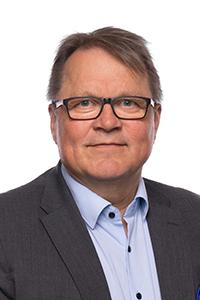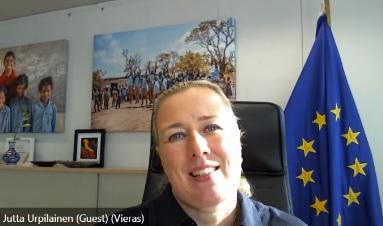Rakentavaa keskustelua perheviljelmien tulevaisuudesta
Uutinen
Rakentavaa keskustelua perheviljelmien tulevaisuudesta
26.10.2022
Maailman tuottajajärjestön WFO:n hallituksen jäsen Kati Partanen tapasi EU:n kansainvälisistä kumppanuuksista vastaavan komissaari Jutta Urpilaisen (INTPA). Vilkas keskustelu kosketteli ruokaturvaa ja perheviljelmien mahdollisuuksia globaalisti sopeutua uuteen toimintaympäristöön. Komissaarin huolena on ollut viime viikkoina erityisesti energia sekä lannoitteiden hinta ja saatavuus viljelijöille.
Viljelijät kohtaavat monia haasteita, jotka konkretisoituvat nälkää näkevien ja aliravittujen määrässä maailmalla. YK:n tavoitteiden mukaisesti nälkäongelmaa saatiin vähennettyä, mutta ongelmissa olevien ihmisten määrä kääntyi kasvuun 2014. Sään ääri-ilmiöt, korona ja viimeisimpänä Ukrainan tilanne on kärjistänyt tilannetta entisestään.

Mailman viljelijäjärjestö WFO:n hallituksen ja MTK:n johtokunnan jäsen Kati Partanen
Maailman tuottajajärjestö WFO on selvittänyt jäsentensä tarpeita. Viljelijät kaipaavat tukea osaamiseen resilienssin rakentamiseen muuttuvassa toimintaympäristössä, viljelysuunnitelmien ja tilojen strategioiden rakentamiseen investointisuunnitelmien pohjiksi. Osaaminen ja tutkimustietoon perustuva kehittäminen korostuvat monella tasolla. Tuen rakentaminen viljelijäjärjestöjen yhteistyön kasvattamiselle on tärkeää tavoitteiden saavuttamiseksi ja pienviljelijöiden kohtaamiseksi. Vaikeissa tilanteissa maaseudun naiset ovat monesti haavoittuvaisimmassa asemassa. Poliittisesti tarvitaan tukea myös tuotantopanosten, kuten lannoitteiden saatavuuteen.
Komissaarin mukaan EU panostaa kriisiin paljon, 7,7 miljardia euroa, josta neljännes menee humanitääriseen apuun tällä hetkellä. EU halaa panostaa ekologisesti kestäviin ruokajärjestelmin. Monia ongelmia on tunnistettu logistiikassa, varastoinnissa, osaamisessa ja teknologian saatavuudessa. Oleellista olisi saada paikalliset ja alueelliset ruokaketjut toimiviksi. Tukemalla perheviljelmiä, vahvistamme myös naisten mahdollisuuksia koulutukseen.
Lannoitemarkkinoilla korostuu Venäjän rooli isona tuottajana. EU ei lähde tukemaan lannoitetuottajia, mutta ratkaisuja etsitään yhteistyössä muiden toimijoiden kanssa, jotta tuottavuus voidaan turvata. Orgaanisten lannoitteiden asemaa EU pyrkii parantamaan. Partanen nosti esiin myös ravinnehävikin, josta ei keskustella lainkaan yhtä painokkaasti kuin ruokahävikistä. Turvallisia ratkaisuja pitää löytää kaikkiin ravinnevirtoihin. Lannoitemarkkinoille tarvitaan myös vihreää typpilannoitetta Euroopasta.
Alla WFO:n Kati Partasen kirje komissaari Urpilaiselle
---------------------------------------------------------------------------
19.10.2022
Dear Commissioner Jutta Urpilainen
World Food Day was celebrated in Rome last Friday in a mixed mood. At the same time, we have seen an increase in hunger and malnutrition since 2014, extreme weather events caused by climate change have caused huge crop losses, Covid-19 has caused many countries to reconsider their trade policies, and finally, Russian aggression in Ukraine has shown the dependence of the food chain on the global input market.
Our General Assembly in June 2022 stressed that in view of the many threats to global food security, including most recently the war in Ukraine: Farmers of the world of the world launch an urgent appeal to governments and other decision makers to take food production seriously and avoid measures that will damage food production.
We have been pleased to follow the Commission's actions to actively keep the world's food logistics open. EU measures to improve market access for Ukrainian products are significant. Especially in trade policy, efforts must be made to prevent the increase of export duties and restrictions. We have worriedly analysed the effects of the EU's Farm to Fork strategy on the global food supply and, on the one hand, on the ability of African operators to meet the new requirements set for export.
We have actively work in UN’s Global Crisis Response Group on Food, Energy and Finance. One of the challenges is maintain fertility of soil either through organic or chemical fertilizers. Efficient and productive agriculture is a lifeline for food security but also important for reducing deforestation. There are large differences in the availability of fertilizers and other means to ensure soil health between countries and regions. Chemical fertilizers have still a critical role to ensure sufficient food production in many areas specially during the coming farming seasons. In addition, it should be noted that possibilities by small farmers to obtain sufficient nutrients for their farming is often significantly lower than that of commercial farms. The importance of small farmers in local food security is great.
In our survey farmers recommend that all stakeholders at all levels:
-
Increase investments in building farmers’ capacities and skills so to enable them to be more resilient to changed circumstances and use of technologies.
-
Help farmers to changes in farming plans, strategies and approaches require a combination of investments, knowledge, and capacity building by farmers.
-
Create an enabling financial and political framework that support farmers and enable them, especially smallholders, to diversify their sources of fertilisers also through investments in research and training for farmers.
-
Recognize that women farmers are particularly vulnerable to shocks and develop targeted measures that address these vulnerabilities.
-
Empower Farmers’ Organizations to improve their capability to accompany the farmers in the process of change and in all the previous points mentioned above.
It is important for farmers worldwide to diversify the availability of nutrients because the increase in costs must be considered in the current shortage. Approaches in use include, for example, the recycling of livestock manure produced on the farm to recover nutrients from various waste streams (wastewater, municipal waste, industrial waste). We have talked a lot about the role of food waste, but in the same way we have food waste in our societies when the circular economy has not been emphasized in the supply of nutrients and it should be part of the EU's Green Deal.
Kati Partanen
Member of the Board
World Farmers Organisation

Juha Ruippo
johtaja, kauppapolitiikka ja kansainväliset suhteet
kehitysyhteistyö, EU-asiat, pohjoismainen viljelijäyhteistyö (NBC), WFO, FAO, AgriCord, Food Systems Summit
+358 20 413 2341
+358 40 55 33 232
aiheet: kati partanen, wfo, jutta urpilainen

